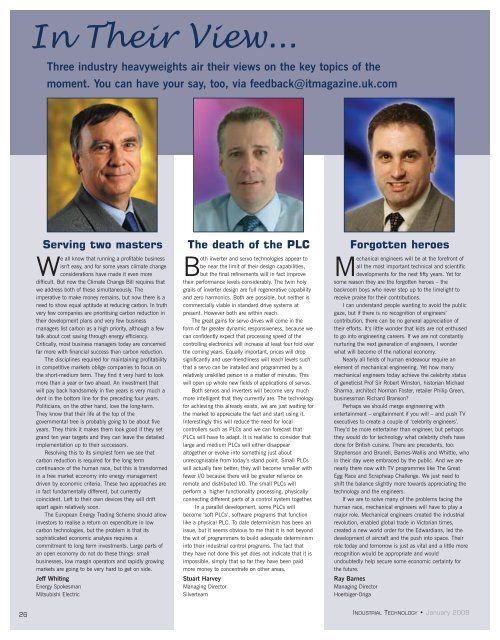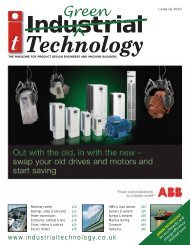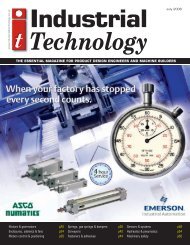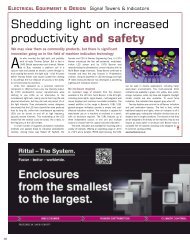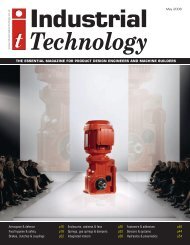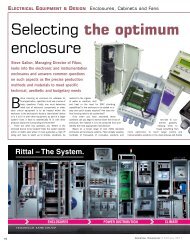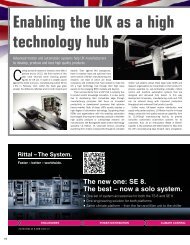IT Jan 2008 - Industrial Technology Magazine
IT Jan 2008 - Industrial Technology Magazine
IT Jan 2008 - Industrial Technology Magazine
You also want an ePaper? Increase the reach of your titles
YUMPU automatically turns print PDFs into web optimized ePapers that Google loves.
In Their View...<br />
Three industry heavyweights air their views on the key topics of the<br />
moment. You can have your say, too, via feedback@itmagazine.uk.com<br />
Serving two masters<br />
We all know that running a profitable business<br />
isn’t easy, and for some years climate change<br />
considerations have made it even more<br />
difficult. But now the Climate Change Bill requires that<br />
we address both of these simultaneously. The<br />
imperative to make money remains, but now there is a<br />
need to show equal aptitude at reducing carbon. In truth<br />
very few companies are prioritising carbon reduction in<br />
their development plans and very few business<br />
managers list carbon as a high priority, although a few<br />
talk about cost saving through energy efficiency.<br />
Critically, most business managers today are concerned<br />
far more with financial success than carbon reduction.<br />
The disciplines required for maintaining profitability<br />
in competitive markets oblige companies to focus on<br />
the short-medium term. They find it very hard to look<br />
more than a year or two ahead. An investment that<br />
will pay back handsomely in five years is very much a<br />
dent in the bottom line for the preceding four years.<br />
Politicians, on the other hand, love the long-term.<br />
They know that their life at the top of the<br />
governmental tree is probably going to be about five<br />
years. They think it makes them look good if they set<br />
grand ten year targets and they can leave the detailed<br />
implementation up to their successors.<br />
Resolving this to its simplest form we see that<br />
carbon reduction is required for the long term<br />
continuance of the human race, but this is transformed<br />
in a free market economy into energy management<br />
driven by economic criteria. These two approaches are<br />
in fact fundamentally different, but currently<br />
coincident. Left to their own devices they will drift<br />
apart again relatively soon.<br />
The European Energy Trading Scheme should allow<br />
investors to realise a return on expenditure in low<br />
carbon technologies, but the problem is that its<br />
sophisticated economic analysis requires a<br />
commitment to long term investments. Large parts of<br />
an open economy do not do these things: small<br />
businesses, low margin operators and rapidly growing<br />
markets are going to be very hard to get on side.<br />
Jeff Whiting<br />
Energy Spokesman<br />
Mitsubishi Electric<br />
The death of the PLC<br />
Both inverter and servo technologies appear to<br />
be near the limit of their design capabilities,<br />
but the final refinements will in fact improve<br />
their performance levels considerably. The twin holy<br />
grails of inverter design are full regenerative capability<br />
and zero harmonics. Both are possible, but neither is<br />
commercially viable in standard drive systems at<br />
present. However both are within reach.<br />
The great gains for servo drives will come in the<br />
form of far greater dynamic responsiveness, because we<br />
can confidently expect that processing speed of the<br />
controlling electronics will increase at least four fold over<br />
the coming years. Equally important, prices will drop<br />
significantly and user-friendliness will reach levels such<br />
that a servo can be installed and programmed by a<br />
relatively unskilled person in a matter of minutes. This<br />
will open up whole new fields of applications of servos.<br />
Both servos and inverters will become very much<br />
more intelligent that they currently are. The technology<br />
for achieving this already exists, we are just waiting for<br />
the market to appreciate the fact and start using it.<br />
Interestingly this will reduce the need for local<br />
controllers such as PLCs and we can forecast that<br />
PLCs will have to adapt. It is realistic to consider that<br />
large and medium PLCs will either disappear<br />
altogether or evolve into something just about<br />
unrecognisable from today’s stand point. Small PLCs<br />
will actually fare better; they will become smaller with<br />
fewer I/O because there will be greater reliance on<br />
remote and distributed I/O. The small PLCs will<br />
perform a higher functionality processing, physically<br />
connecting different parts of a control system together.<br />
In a parallel development, some PLCs will<br />
become ‘soft PLCs’, software programs that function<br />
like a physical PLC. To date determinism has been an<br />
issue, but it seems obvious to me that it is not beyond<br />
the wit of programmers to build adequate determinism<br />
into their industrial control programs. The fact that<br />
they have not done this yet does not indicate that it is<br />
impossible, simply that so far they have been paid<br />
more money to concentrate on other areas.<br />
Stuart Harvey<br />
Managing Director<br />
Silverteam<br />
Forgotten heroes<br />
Mechanical engineers will be at the forefront of<br />
all the most important technical and scientific<br />
developments for the next fifty years. Yet for<br />
some reason they are the forgotten heroes – the<br />
backroom boys who never step up to the limelight to<br />
receive praise for their contributions.<br />
I can understand people wanting to avoid the public<br />
gaze, but if there is no recognition of engineers’<br />
contribution, there can be no general appreciation of<br />
their efforts. It’s little wonder that kids are not enthused<br />
to go into engineering careers. If we are not constantly<br />
nurturing the next generation of engineers, I wonder<br />
what will become of the national economy.<br />
Nearly all fields of human endeavour require an<br />
element of mechanical engineering. Yet how many<br />
mechanical engineers today achieve the celebrity status<br />
of geneticist Prof Sir Robert Winston, historian Michael<br />
Sharma, architect Norman Foster, retailer Philip Green,<br />
businessman Richard Branson?<br />
Perhaps we should merge engineering with<br />
entertainment – engitainment if you will – and push TV<br />
executives to create a couple of ‘celebrity engineers’.<br />
They’d be more entertainer than engineer, but perhaps<br />
they would do for technology what celebrity chefs have<br />
done for British cuisine. There are precedents, too:<br />
Stephenson and Brunell, Barnes-Wallis and Whittle, who<br />
in their day were embraced by the public. And we are<br />
nearly there now with TV programmes like The Great<br />
Egg Race and Scrapheap Challenge. We just need to<br />
shift the balance slightly more towards appreciating the<br />
technology and the engineers.<br />
If we are to solve many of the problems facing the<br />
human race, mechanical engineers will have to play a<br />
major role. Mechanical engineers created the industrial<br />
revolution, enabled global trade in Victorian times,<br />
created a new world order for the Edwardians, led the<br />
development of aircraft and the push into space. Their<br />
role today and tomorrow is just as vital and a little more<br />
recognition would be appropriate and would<br />
undoubtedly help secure some economic certainty for<br />
the future.<br />
Ray Barnes<br />
Managing Director<br />
Hoerbiger-Origa<br />
26<br />
INDUSTRIAL TECHNOLOGY • <strong>Jan</strong>uary <strong>2008</strong>


